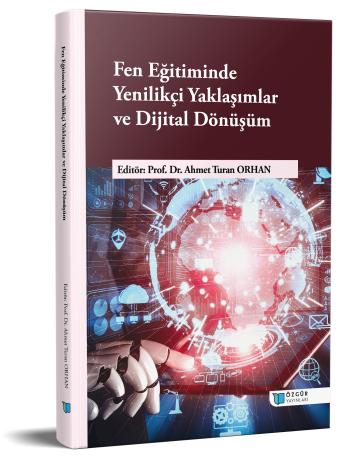
Innovative Approaches and Digital Transformation in Science Education
Synopsis
In today's rapidly changing age of information and technology, innovative approaches to science education and digital transformation play a key role in developing students' scientific thinking, problem-solving and creative production skills. These changes must be incorporated into the learning process. At the same time, learning is not confined to the classroom; it is a lifelong process enriched by interaction with the environment. Created in line with these ideas, this book consists of four sections.
The first section is structured under the heading 'The Effects of Acquiring Creativity and Innovation Skills with Artificial Intelligence on Science Education'. Due to its interdisciplinary nature, science education interacts constantly with current developments, particularly technological advances such as artificial intelligence. The rise of artificial intelligence in education means that science education must adapt to this change by developing creative and innovative approaches. In this context, the interaction between science education and artificial intelligence is evaluated in terms of opportunities and potential risks.
The second section is titled 'Technology-Supported Argumentation-Based Science Learning Approach'. In science education, students learn by researching, questioning and experiencing knowledge in the same way as scientists. Argumentation is an effective learning approach in this process, where scientific claims are supported by evidence and debated. However, as written argumentation can be tedious, this section emphasizes that it can be made more engaging and motivating by transferring it to a digital environment using technological tools.
The third section is titled 'The Current Place of Science Education and the Inevitable Digital Transformation'. While the aim of science education is to train students to produce solutions to contemporary problems, digital tools and technologies can make this process more effective and inclusive. Augmented reality, game-based applications and artificial intelligence-supported measurement and evaluation systems play an important role in developing students' cognitive, emotional and social skills. Digital transformation encompasses not only the integration of technology, but also the holistic redesign of learning environments, processes, and accessibility.
The fourth section is titled 'The Out-of-School Learning Approach in Science Education'. As learning is a lifelong process that begins at birth, it should not be confined to the school environment. Interacting with the environment, particularly in early years, is crucial for learning and development. Out-of-school learning environments, such as parks, gardens and museums, facilitate learning through experience, making it more meaningful, interesting and motivating. Using such environments for subjects directly related to life, such as science, is an appropriate teaching method that supports the development of learning outcomes.
Finally, I would like to thank all our esteemed authors for their contributions to this book, titled Innovative Approaches and Digital Transformation in Science Education, in the hope that it will benefit all those passionate about education and teaching, as well as contributing to the field's literature.
Editor
Prof. Dr. Ahmet Turan ORHAN

